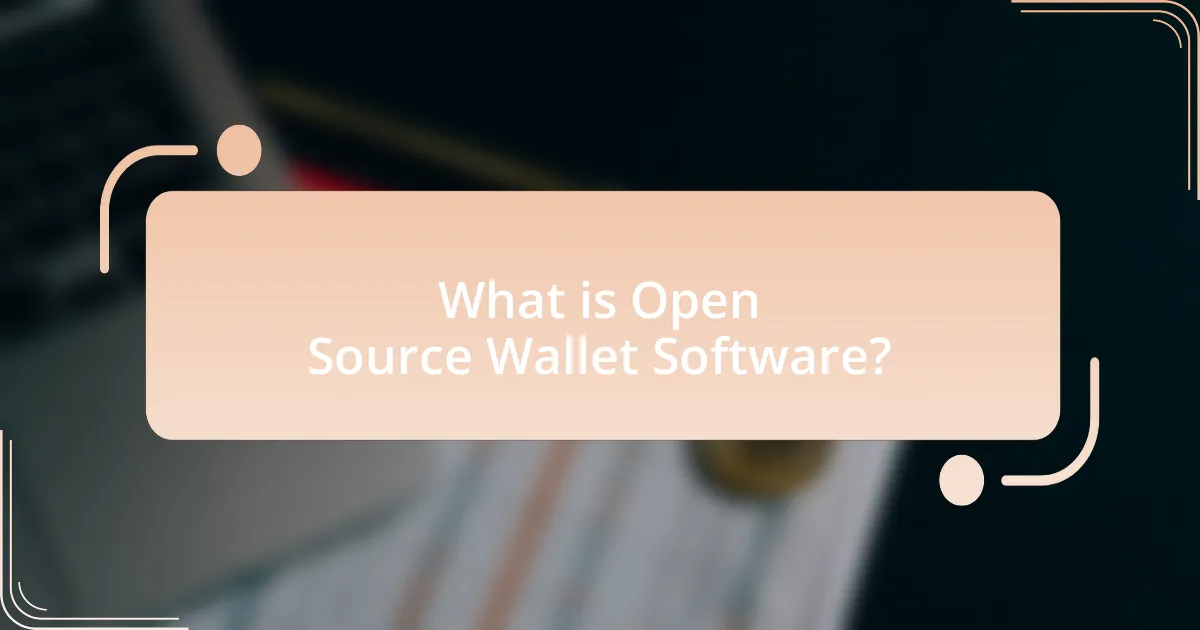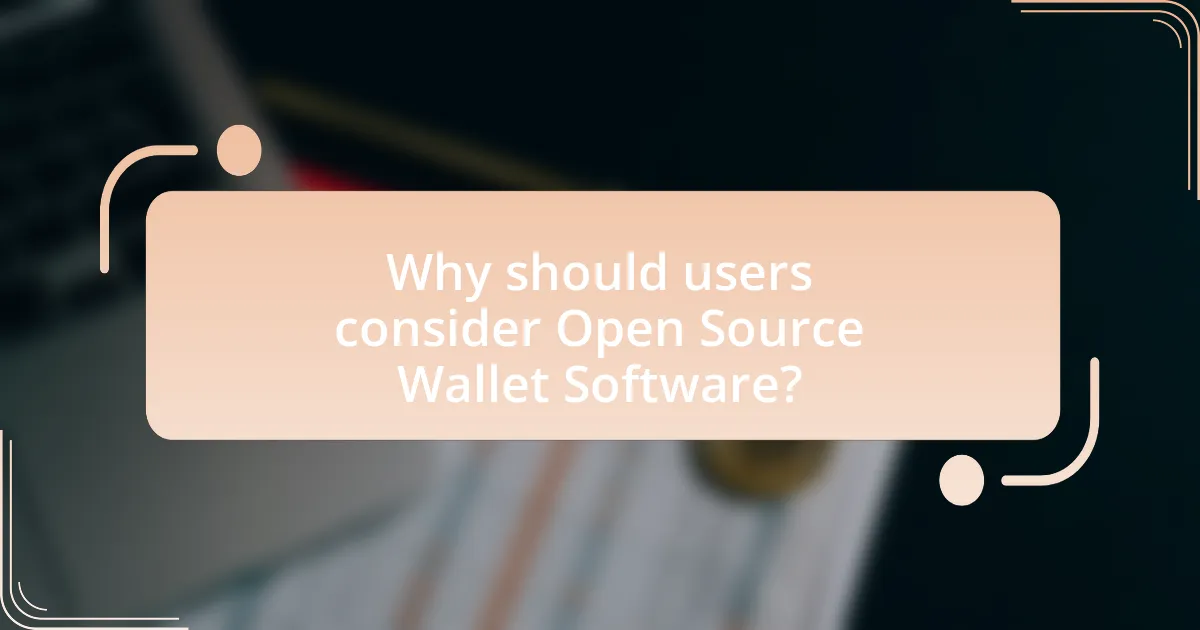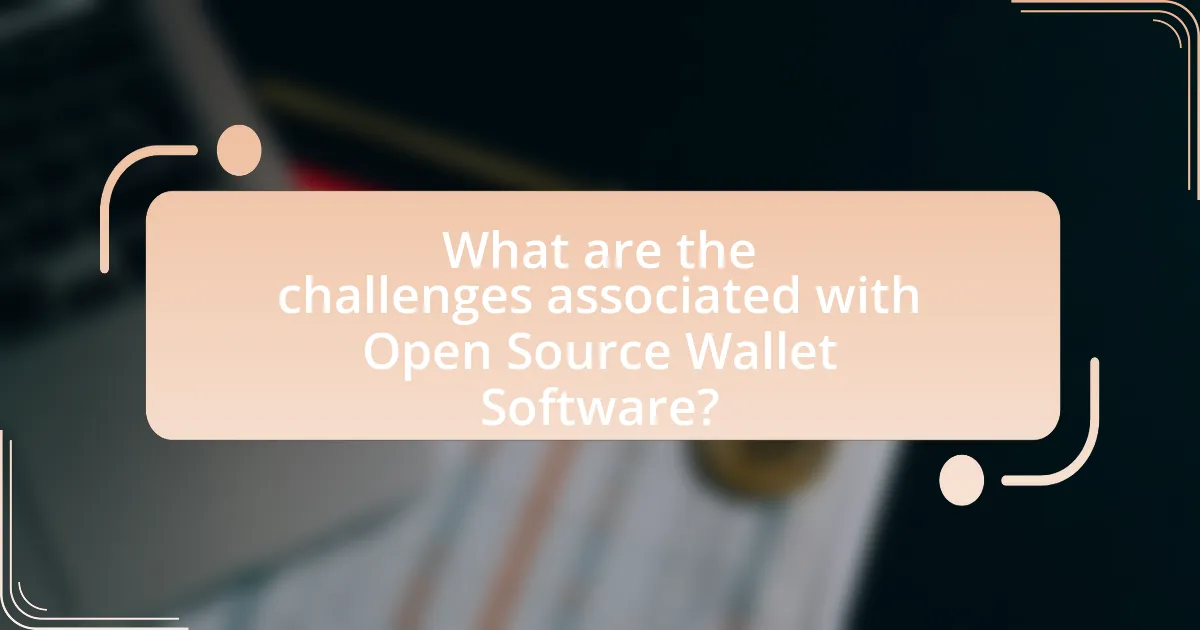Open source wallet software is a digital wallet application with publicly available source code, allowing users to inspect, modify, and enhance its functionality. This transparency fosters trust and security, as users can verify the software’s integrity and collaborate on improvements. Key features include enhanced security through community-driven development, customization options, and cost benefits, making it a compelling choice for managing cryptocurrencies. The article also addresses the challenges associated with open source wallets, such as security vulnerabilities and reliance on community support, while providing guidance on selecting reputable software and best practices for usage.

What is Open Source Wallet Software?
Open source wallet software is a type of digital wallet application whose source code is made publicly available for anyone to inspect, modify, and enhance. This transparency allows users to verify the security and functionality of the software, fostering trust within the community. Open source wallet software often benefits from collaborative development, where contributions from various developers can lead to more robust features and quicker identification of vulnerabilities. For example, popular open source wallets like Electrum and MyEtherWallet have gained user trust due to their transparent code and active community support.
How does Open Source Wallet Software function?
Open source wallet software functions by allowing users to manage their cryptocurrency through publicly available code that can be inspected, modified, and distributed by anyone. This transparency ensures that the software can be audited for security vulnerabilities, enabling users to trust the integrity of their transactions and funds. Additionally, open source wallets typically utilize decentralized protocols, which means that users retain control over their private keys and funds, reducing reliance on third-party services. The collaborative nature of open source development fosters continuous improvement and innovation, as developers from around the world contribute to enhancing features and security measures.
What are the key features of Open Source Wallet Software?
Open Source Wallet Software is characterized by its transparency, security, and community-driven development. Transparency allows users to inspect the code for vulnerabilities, ensuring a higher level of security compared to proprietary software. Community-driven development fosters continuous improvement and innovation, as developers from around the world contribute to the software, often leading to faster updates and bug fixes. Additionally, open source wallets typically support a wide range of cryptocurrencies, providing users with flexibility in managing their digital assets. These features collectively enhance user trust and promote a collaborative ecosystem in the cryptocurrency space.
How does the code transparency impact user trust?
Code transparency significantly enhances user trust by allowing users to verify the integrity and security of the software they are using. When users can access and review the source code, they gain confidence that the software operates as intended and does not contain hidden vulnerabilities or malicious features. A study by the University of Cambridge found that open-source projects with transparent codebases tend to have fewer security vulnerabilities, as the collaborative nature of open-source development encourages thorough peer review and rapid identification of issues. This transparency fosters a sense of accountability among developers, further solidifying user trust in the software.
What are the advantages of using Open Source Wallet Software?
Open source wallet software offers several advantages, including enhanced security, transparency, and community support. The open-source nature allows anyone to inspect the code, which helps identify vulnerabilities and ensures that the software is free from hidden malicious features. According to a study by the University of California, Berkeley, open-source projects benefit from collaborative development, leading to faster bug fixes and improvements. Additionally, users can customize the software to meet their specific needs, providing flexibility that proprietary wallets may not offer. This combination of security, transparency, and adaptability makes open source wallet software a compelling choice for users seeking reliable cryptocurrency management solutions.
How does Open Source Wallet Software enhance security?
Open Source Wallet Software enhances security by allowing anyone to inspect, audit, and improve the code, which reduces vulnerabilities. This transparency enables a community of developers and security experts to identify and fix security flaws more rapidly than proprietary software, where the code is hidden. For instance, a study by the University of California, Berkeley, found that open source projects benefit from a larger pool of contributors, leading to faster identification of bugs and security issues, ultimately resulting in more robust software.
What cost benefits does Open Source Wallet Software provide?
Open Source Wallet Software provides significant cost benefits by eliminating licensing fees associated with proprietary software. Users can access, modify, and distribute the software without incurring costs, which reduces overall expenses for individuals and businesses. Additionally, the collaborative nature of open source projects often leads to faster development and innovation, resulting in lower maintenance costs over time. According to a study by the Open Source Initiative, organizations that adopt open source solutions can save up to 90% on software costs compared to traditional proprietary options.

Why should users consider Open Source Wallet Software?
Users should consider Open Source Wallet Software because it offers transparency, security, and community support. Open source software allows users to inspect the code, ensuring there are no hidden vulnerabilities or malicious features, which enhances trust. Additionally, the collaborative nature of open source projects often leads to faster identification and resolution of security issues, as seen in projects like Bitcoin Core, where a large community actively contributes to code reviews and updates. This collective effort results in a more robust and secure wallet solution compared to proprietary alternatives, which may not disclose their code or security practices.
What unique benefits does Open Source Wallet Software offer compared to proprietary options?
Open Source Wallet Software offers unique benefits such as enhanced security, transparency, and community-driven development compared to proprietary options. The open-source nature allows anyone to inspect the code for vulnerabilities, leading to quicker identification and resolution of security issues. Additionally, users can verify that the software does not contain hidden backdoors or malicious features, which is often not possible with proprietary software. Community contributions foster continuous improvement and innovation, as developers from around the world can collaborate to enhance functionality and user experience. This collaborative approach has been shown to result in more robust and reliable software, as evidenced by the widespread adoption of successful open-source projects like Bitcoin Core, which has undergone extensive peer review and testing.
How does community support improve Open Source Wallet Software?
Community support enhances Open Source Wallet Software by facilitating collaborative development, which leads to more robust and secure applications. When a community actively participates, it contributes to code reviews, bug fixes, and feature enhancements, resulting in higher quality software. For instance, projects like Bitcoin Core benefit from thousands of contributors who identify vulnerabilities and propose improvements, significantly increasing the software’s reliability. Additionally, community feedback helps developers prioritize features that users find most valuable, ensuring the software meets real-world needs effectively. This collective effort not only accelerates innovation but also fosters trust among users, as transparency in development processes is a hallmark of open-source projects.
What role does customization play in user experience?
Customization significantly enhances user experience by allowing individuals to tailor software interfaces and functionalities to their specific needs and preferences. This personalization leads to increased user satisfaction, as studies indicate that 70% of consumers prefer brands that offer personalized experiences. Furthermore, customization fosters user engagement, as users are more likely to interact with software that reflects their unique requirements, ultimately resulting in higher retention rates. In the context of open source wallet software, the ability to modify features and design can directly impact usability and user satisfaction, reinforcing the importance of customization in creating a positive user experience.
How does Open Source Wallet Software contribute to financial inclusion?
Open Source Wallet Software contributes to financial inclusion by providing accessible, customizable, and cost-effective financial tools for underserved populations. This software allows users to manage their finances without the barriers of traditional banking systems, which often require high fees or minimum balances. According to a report by the World Bank, approximately 1.7 billion adults remain unbanked, and open-source solutions can bridge this gap by enabling individuals to transact, save, and invest using their mobile devices. Furthermore, the transparency and security inherent in open-source software foster trust among users, encouraging broader adoption and participation in the financial ecosystem.
In what ways does Open Source Wallet Software lower barriers to entry?
Open Source Wallet Software lowers barriers to entry by providing free access to its code, enabling users to download, modify, and use the software without financial constraints. This accessibility allows individuals from diverse economic backgrounds to participate in digital currency transactions without the need for expensive proprietary solutions. Additionally, the transparency of open source code fosters trust, as users can verify the security and functionality of the wallet themselves, reducing reliance on third-party assurances. According to a report by the Open Source Initiative, open source projects often lead to increased innovation and community support, further enhancing user experience and confidence in using these wallets.
How can Open Source Wallet Software empower underserved communities?
Open Source Wallet Software can empower underserved communities by providing accessible, transparent, and customizable financial tools. These communities often face barriers to traditional banking services, and open source solutions eliminate costs associated with proprietary software, allowing users to manage their finances without fees. Additionally, the transparency of open source code fosters trust, as users can verify the security and functionality of the software themselves. According to a report by the World Bank, financial inclusion can increase economic opportunities and reduce poverty, demonstrating that accessible financial tools can significantly impact underserved populations.

What are the challenges associated with Open Source Wallet Software?
Open Source Wallet Software faces several challenges, including security vulnerabilities, lack of support, and user experience issues. Security vulnerabilities arise because the code is publicly accessible, making it easier for malicious actors to identify and exploit weaknesses. Additionally, the lack of dedicated support can lead to difficulties for users who encounter problems, as community-driven support may not be as reliable or timely as commercial alternatives. User experience issues often stem from the varying levels of technical expertise among users, which can result in a steep learning curve and potential usability barriers. These challenges highlight the complexities involved in utilizing open source wallet software effectively.
What security risks should users be aware of?
Users should be aware of several security risks associated with open source wallet software, including vulnerabilities in the code, potential for malware, and phishing attacks. Open source software can contain undiscovered bugs that may be exploited by attackers, as evidenced by the 2020 vulnerability in the Ethereum wallet, which allowed unauthorized access to user funds. Additionally, users may inadvertently download malicious versions of the software, leading to data theft or loss of assets. Phishing attacks, where users are tricked into providing sensitive information through fake websites or emails, are also prevalent in the cryptocurrency space, highlighting the need for vigilance.
How can users mitigate potential vulnerabilities?
Users can mitigate potential vulnerabilities by regularly updating their open-source wallet software to the latest version, which often includes security patches and improvements. Keeping software up-to-date is crucial as it addresses known vulnerabilities that could be exploited by attackers. Additionally, users should employ strong, unique passwords and enable two-factor authentication to add an extra layer of security. According to a study by the Cybersecurity & Infrastructure Security Agency, 80% of data breaches involve weak or stolen passwords, highlighting the importance of robust password practices. Furthermore, users should conduct regular security audits and utilize reputable security tools to identify and address vulnerabilities proactively.
What are the implications of relying on community-driven support?
Relying on community-driven support can lead to increased innovation and rapid problem-solving in open source wallet software. This collaborative approach harnesses diverse expertise, allowing for quicker identification and resolution of issues compared to traditional support models. For instance, projects like Bitcoin and Ethereum benefit from active community contributions, which enhance security and functionality through collective input. Additionally, community-driven support fosters a sense of ownership and engagement among users, leading to sustained improvements and a robust ecosystem. This dynamic can be evidenced by the continuous updates and enhancements seen in popular open source wallets, driven by user feedback and contributions.
How can users effectively choose Open Source Wallet Software?
Users can effectively choose Open Source Wallet Software by evaluating the software’s security features, community support, and user reviews. Security is paramount; users should look for wallets that have undergone independent audits and have a transparent development process. Community support indicates the software’s reliability and longevity; active forums and regular updates suggest a robust user base and ongoing improvements. User reviews provide insights into real-world experiences, helping users gauge usability and functionality. By focusing on these criteria, users can make informed decisions that align with their security and usability needs.
What criteria should be considered when evaluating options?
When evaluating options for open source wallet software, key criteria include security, user control, community support, and compatibility. Security is paramount, as users need assurance that their funds and data are protected against breaches; for instance, open source software allows for public scrutiny, which can enhance security through community audits. User control is essential, as open source wallets enable users to manage their private keys, ensuring they retain ownership of their assets. Community support is also critical, as a strong community can provide ongoing updates, troubleshooting, and enhancements, which are vital for software longevity and reliability. Lastly, compatibility with various cryptocurrencies and platforms ensures that users can utilize the wallet across different ecosystems, maximizing its utility.
How can users ensure they select a reputable Open Source Wallet?
Users can ensure they select a reputable Open Source Wallet by researching the wallet’s development community and examining its codebase for transparency and security. A strong indicator of a reputable wallet is an active community of developers and users who contribute to its ongoing improvement and security audits. Additionally, users should check for positive reviews and feedback from trusted sources, as well as the wallet’s history of updates and responsiveness to vulnerabilities. For instance, wallets like Electrum and MyEtherWallet have established reputations due to their long-standing presence in the market and consistent updates, demonstrating reliability and user trust.
What best practices should users follow when using Open Source Wallet Software?
Users should follow several best practices when using Open Source Wallet Software to ensure security and efficiency. First, users must verify the authenticity of the software by downloading it from reputable sources or official repositories, as this reduces the risk of malware. Additionally, users should regularly update the wallet software to benefit from security patches and improvements, as outdated software can be vulnerable to attacks.
Moreover, users should enable two-factor authentication (2FA) whenever available, as this adds an extra layer of security against unauthorized access. It is also crucial for users to back up their wallet data securely, ensuring that they can recover their funds in case of device failure or loss.
Finally, users should educate themselves about the wallet’s features and security settings, as understanding how to use the software effectively can prevent common pitfalls. Following these practices helps maintain the integrity and security of funds stored in open source wallets.